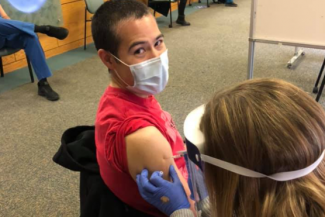
By Nathaniel Chin, MD, medical director for Wisconsin Alzheimer's Disease Research Center (ADRC) and Wisconsin Registry for Alzheimer's Prevention (WRAP)
Photo caption for photo at right: Nathaniel Chin, MD, receives a COVID-19 vaccination. Dr. Chin says about the vaccine: "I believe in science. I believe in the individual protecting the community. I believe there are some things that can unite us, all of us."
For nearly one year, COVID-19 has upended our lives in uncountable ways. The medical and science communities have been researching the virus and making incredible strides in developing recommendations that people can follow to reduce their risk for contracting COVID-19. I believe the most exciting advancement is the introduction of new vaccines to protect people against serious illness from the coronavirus.
While the vaccines are a huge success and will be incredibly helpful in limiting the spread of COVID-19, they will not solve the coronavirus problem immediately. It will be many months before the vaccine is available to everyone who wants to get it. We still need to continue to care about each other and help keep each other safe. I encourage you all to follow recommendations from national and local health officials on limiting the spread of COVID-19: Wear masks in public and around people you do not live with, practice physical distancing, and wash your hands regularly.
The staff and investigators within the Alzheimer’s disease research program at the University of Wisconsin-Madison have been following the science. In early 2020, we adopted a “safety first, science second” approach to our Alzheimer’s disease research studies. We made changes to our study visits so we could gather as much information as possible over the phone and reduce or eliminate the need for people to attend in-person research visits. And now, the vaccines have allowed us to provide another layer of safety for our research participants. In recent weeks, some of our staff and researchers have become eligible for the vaccines. The staff members I have spoken with about the vaccines are thankful they can take this important step in creating an even safer environment for in-person research visits, and for our community as a whole.
We look forward to the day when our entire research visit is in-person. The data we collect from the thinking tests, brain scans, and lumbar punctures is absolutely critical in our fight against Alzheimer’s disease. The biomarkers we study are the tools needed to understand and cure this disease. The vaccine will help get us there; but even then, we will continue to wear masks, respect distance, and disinfect to keep everyone safe. Whether it’s COVID-19 or Alzheimer’s disease, we are in this together.
I believe it is extremely important to also mention that COVID-19 is affecting certain groups of people differently than others. Inequities exist throughout our healthcare system. Racism, ageism, where you live, and socioeconomic status affect not only a person’s access to healthcare, but also their access to the vaccine. We all need to stay vigilant in protecting our communities — not just the ones we are a part of, but all of our communities.
I look forward to offering future updates on the vaccines and guidance from state and local health officials as health and safety recommendations evolve. In the meantime, you can find information about the COVID-19 vaccine and how to get it from Public Health Madison & Dane County and Wisconsin Department of Health Services.
Learn more
The following list of resources offers information and education about the COVID-19 vaccines:
- Dr. Anthony Fauci, director of the National Institute of Allergy and Infections Diseases and chief medical advisor to President Joe Biden, discusses the impact the COVID-19 vaccine will have on the dementia community. "Dr. Fauci interview" (Massachusetts General Hospital/YouTube)
- In this half-hour special, actor, director, producer and screenwriter Tyler Perry sits down with top medical experts Carlos del Rio, MD, executive associate dean, Emory School of Medicine at Grady Health System, and Kimberly Dyan Manning, MD, professor of medicine at Grady Health System, to address the public's concerns and fears about the COVID-19 vaccine. "COVID-19 Vaccine and the Black Community: A Tyler Perry Special" (Tyler Perry Studios/YouTube)
- Vaccine development that would typically take years was shortened to a timeframe of months. How did the science community do it? Is it safe? This article explains it all. "'A huge experiment': How the world made so much progress on a Covid-19 vaccine so fast" (STAT news)
- Kizzmekia Corbett, PhD, is an immunologist at the National Institutes of Health (NIH) and one of the designers of the Moderna COVID-19 vaccine. Learn about her and her work on the vaccine in "Meet the Black female scientist at the forefront of COVID-19 vaccine development" (CBS News) and her work talking about vaccine science with people of color in "This COVID-vaccine designer is tackling vaccine hesitancy — in churches and on Twitter" (Nature).
- Shenikqua Bouges, MD, assistant professor in the UW Department of Medicine Division of Geriatrics and Gerontology, offers a detailed explanation of the science behind the vaccine and answered common questions in this presentation. "COVID-19 Updates for 2021" (Wisconsin ADRC/YouTube)
- Ann Braus, MD, assistant professor in the UW Department of Medicine Division of Geriatrics and Gerontology, sat down for a COVID-19 Q&A with representatives from Capitol Lakes, a continuing care retirement community in Madison, Wisconsin. "COVID-19 Vaccine Questions & Answers with Ann Braus, MD" (Capitol Lakes/YouTube)
- Follow the Facebook page Covid-19 Information for the Oneida Community.
- Follow the Facebook page Covid-19 Info for Madison’s Black Community.
- Log in to post comments



